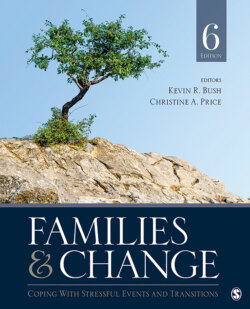Читать книгу Families & Change - Группа авторов - Страница 57
На сайте Литреса книга снята с продажи.
Acceptance and Change
ОглавлениеLinehan’s DBT model (1993, 2020) emphasizes a dialectic, or joining of opposites and in particular: acceptance and change. This stance is important for facilitators working with families similar to Jean and Tonya. The systemic oppressive practices are not their fault, yet they impact the real lived experiences of such families and many minoritized individuals and families. When utilizing tools such as mindfulness to create change, whether that change is designed to impact a mental health symptom, health issue, family, teaching quality, or agency morale, taking a stance of acceptance of the person just as they are is key especially when minoritized and systematically oppressed individuals and families have not caused the additional conditions (e.g., discriminatory policies, culturally condoned heterosexist, racist, and other related practices across multiple systems including healthcare, education, and “justice” to name a few) heightening their stress response. In other words, mindfulness facilitators, individuals, and families can endeavor for changes while accepting people for who they are.
For future research we might ask the following questions: “What strengths do the minoritized and systematically oppressed develop to manage through their lives?” “How can ‘home practice’ or ‘informal practice’ be cultivated through various forms of inquiry in order to understand and expand the availability of mindfulness among families who may not have access to traditional programming?” “Could there be a family ‘dispositional mindfulness’?” “How can we as practitioners, researchers, and facilitators be open to new categories and new possibilities (Langer, 1983, 2020) designed to empower and support mindfulness for families using a more participatory and culturally proficient lens (Lindsey, Nuri-Robins, Terrell, & Lindsey, 2010)?”
